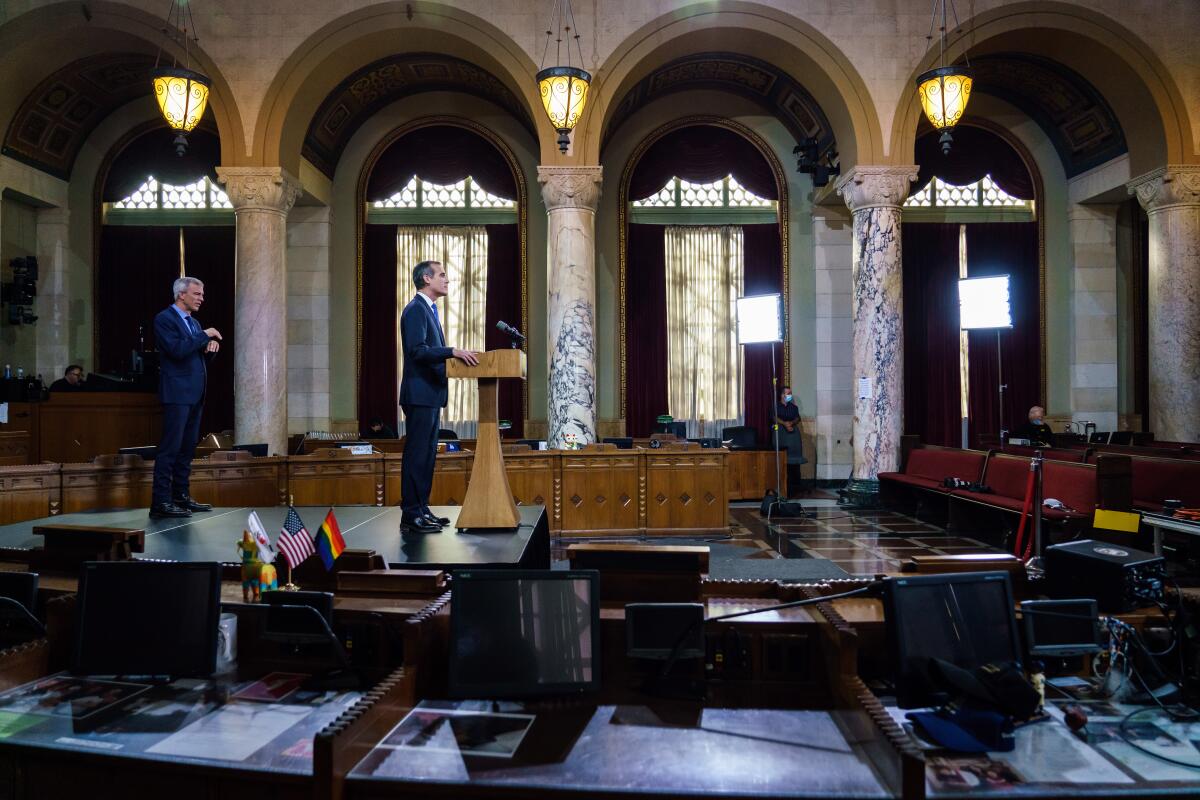Coronavirus is wiping out L.A.’s budget. We need federal help — and so do other cities

- Share via
A year ago, when Mayor Eric Garcetti unveiled his budget for the 2019-20 year, Los Angeles was flush with cash from a strong economy and planning to spend big.
The mayor wanted to spend the extra money to fix more sidewalks, fill more potholes and make city streets safer for pedestrians and cyclists. City workers were going to plant more trees and coat the streets in “cool pavement” to lower the amount of heat they radiated. And the city was increasing the amount of funding available to build homeless shelters and offer services to get people off the streets.
Today? Amid a pandemic that has triggered an economic crisis, the city’s outlook couldn’t look more different.
Garcetti declared a fiscal emergency on Monday when he released his 2020-21 budget plan. Instead of boosting services, the city will slash them. There will be fewer sidewalks and streets repaired, trees trimmed and infrastructure projects completed. There will be less money for graffiti removal, gang intervention, neighborhood councils, animal shelters and pretty much every other public service that isn’t directly related to public health or safety.
And for the first time in nearly a decade, the city will furlough nearly 16,000 civilian employees for up to 26 days next fiscal year. That would equate to a 10% pay cut.
Granted, the city was already headed for some budget turbulence of its own making. After Garcetti and the City Council signed off on half a dozen labor contracts with firefighters, police officers and civilian employees last summer, the city was back in the red and budget analysts warned that some services could be trimmed. But those were longer-term issues. The problems caused by the pandemic are acute, immediate and deep.
And painful. At a time when residents are demanding more from their local government in terms of public health protection and safety net services, their city has significantly less money with which to help them.
Los Angeles is not unique. More than 2,100 cities across the country expect major budget deficits this year, and many will have to cut employees and slash services to break even. No wonder; local governments generate much of their revenue from taxes on sales, business receipts and tourism. With the social-distancing shutdowns, that economic activity has ground to a halt, and tax revenue has fallen off a cliff. Even cities with robust rainy day funds — Los Angeles, for example, had reserves of $560 million last year — will quickly burn through their savings to maintain basic services.
Through its relief program, the federal government has committed to reimburse cities and states for costs associated with the pandemic response. That includes paying overtime for public safety and medical personnel, buying gloves and masks, and providing hotel rooms and expanded shelters for the homeless. But for now, at least, the Trump administration insists that those federal dollars cannot be used to cover general budget shortfalls.
It’s absurd to say that cities’ budget woes are unrelated to the pandemic. Local governments are bleeding revenue because commerce has been shut down to slow COVID-19 and save lives. Businesses are closed. Hotels are empty. Garcetti, like many other mayors, is rightfully pushing the federal government to reimburse local governments for the revenue they lost to help fight the pandemic.
Senate Democrats proposed an additional $150 billion in federal aid to help local, state and tribal governments cover their lost revenue. Some Republicans have refused to consider such a local government bailout, saying it would subsidize bad fiscal decisions that occurred before the pandemic. But the president has said he supports providing such aid, and Treasury Secretary Steven T. Mnuchin said over the weekend that local government relief funding could be included in a future relief package.
As for Los Angeles, budget cuts may be inevitable at this point, but they‘re still hard to take. The city never fully recovered from the last recession and hasn’t restored the services that were cut then. Despite record revenue growth in recent years, the city has struggled to balance its budget.
And that was before the pandemic.
More to Read
A cure for the common opinion
Get thought-provoking perspectives with our weekly newsletter.
You may occasionally receive promotional content from the Los Angeles Times.









